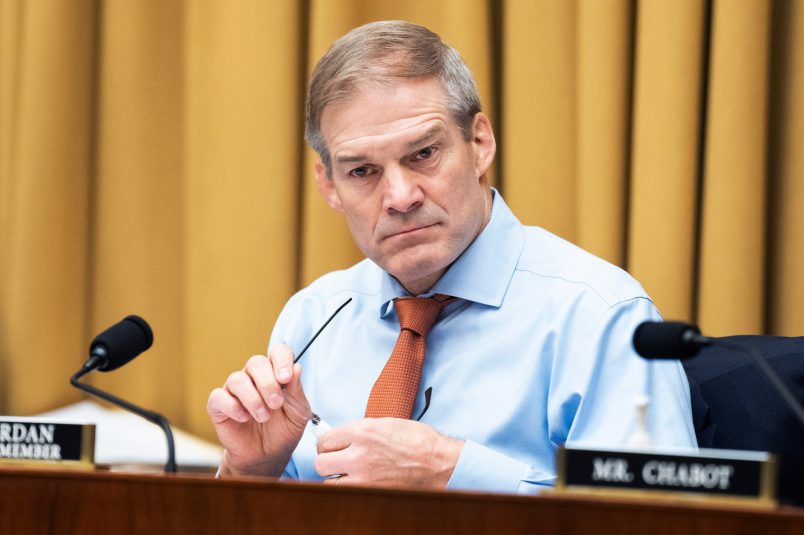The Jan. 6 Select Committee on Tuesday dismissed Rep. Jim Jordan (R-OH)’s list of demands as it issued a stern warning to comply with its subpoena by the end of next week.
Instead of meeting his initial summons to testify last week, Jordan reportedly pushed back against the panel’s subpoena in a letter to the committee and challenged its authority to subpoena him in the first place. Jordan wrote he would only comply with the subpoena if the panel provided him with all of the materials it planned to use to question him if he sat for a deposition.
In a letter dated Tuesday, committee chair Rep. Bennie Thompson (D-MS) rejected Jordan’s “misplaced” rationale for blowing past the deadline. In response to Jordan questioning the committee’s validity, Thompson wrote that the nine-person committee is “duly constituted and empowered” by three U.S. District Court decisions.
Criticizing the makeup and legitimacy of the panel’s authority has been a common line for Trump allies aiming to skirt the committee’s requests.
And Jordan played a role in helping to create that illusion. The congressman was one of five Republicans House Minority Leader Kevin McCarthy (R-CA) offered up to serve on the panel last year. House Speaker Nancy Pelosi (D-CA) rejected Jordan as well as Rep. Jim Banks (R-IN) and McCarthy pulled all five of his members in response.
Jordan has also previously accused the panel of pursuing “political vendettas” against former President Trump and his allies.
Thompson noted the committee’s interest in speaking with Jordan about his communications related to Jan. 6 and the events leading up to the Capitol insurrection, which includes his “widely reported communications” with Trump that day.
Thompson refuted Jordan’s claims that he cannot provide the committee any information beyond what “relates to the performance of official duties,” saying the committee believes the GOP congressman “can provide much more than that.”
“We are aware of numerous meetings, calls and communications that we would like to discuss with you, none of which relates to the electoral certification or even to your role as a Member of Congress,” Thompson wrote.
After providing examples of Jordan’s reported whereabouts in the weeks leading up to the Jan. 6, Thompson wrote that Jordan’s cooperation in the committee’s investigation would give him a chance to “resolve, on the record, inconsistencies in your public statements about the events of January 6.”
“For instance, you have offered inconsistent public statements regarding when and how many times you spoke with President Trump on January 6. You have also claimed you ‘never said the election was stolen,’ despite numerous public statements to the contrary,” Thompson wrote.
Last month, Jordan was subpoenaed by the committee alongside four other sitting GOP members of Congress — McCarthy and Reps. Scott Perry (R-PA), Mo Brooks (R-AL) and Andy Biggs (R-AZ). The committee seeks information from the group of GOP lawmakers related to Jan. 6, including details about their communications with Trump and then-White House chief of staff Mark Meadows before, during and after the Capitol insurrection.
Last week, Biggs formally objected to the committee’s subpoena. On Sunday, Brooks outlined his demands for the panel before he would commit to a testimony during an appearance on Fox News.
In the past year, Jordan has appeared to short-circuit when pressed on his communications with Trump on Jan. 6.
Jordan initially admitted in comments to reporters that he spoke to Trump on the day of the insurrection. But when asked for more details on his communications with Trump, Jordan has become defensive while issuing meandering and contradictory statements, including frequently claiming that he could not recall the amount of times he spoke with Trump on the day of the attack.



